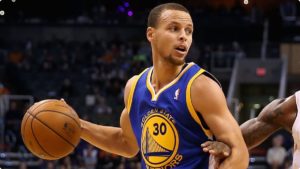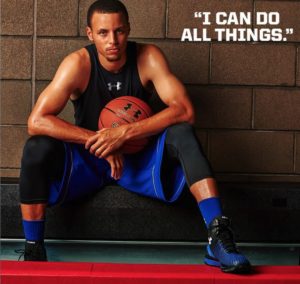This week, one of my “go to” passages has been Acts 5:27-42, which has prompted me to reflect on the resilience of the early disciples of Jesus and the fledgling New Testament church.
From Merriam/Webster’s Dictionary: Resilience. The ability to become strong, healthy, or successful again after something bad happens.
Who do I think of when I ponder over a good example of resilience? I think of this guy.

Yeah . . . I know. I’m a musician. With the exception of rap artist Drake, us musicians don’t have a lot of integrity talking about basketball. But consider a couple of things relative to Stephen Curry:
- As a high school kid, he received All-State honors in North Carolina as a senior at Charlotte Christian School. But (presumably because of his small stature) he received a grand total of zero scholarship offers from major Division I colleges.
- He ultimately chose Davidson College in North Carolina where, as a sophomore, he was instrumental in leading their basketball team to the Elite 8 of the NCAA Tournament. (For those who don’t follow college basketball, trust me on this one—that’s a really big deal.) He could have left college at that point to play professional basketball. But he opted to return to Davidson, out of loyalty to a school that had been good to him, and with a determination to better prepare himself for the NBA.
- Because of his relatively small size, his only hope of playing in the NBA was as a point guard. This meant having to learn a new position and a new method of shooting—an ordeal almost a year in the making, and one that Steph still describes as one of the most horrible periods of his entire life.
- The work paid off when he was drafted by the Golden State Warriors. Another obstacle threatened his career, though. His ankles couldn’t withstand the long NBA seasons and his brutal style of playing. Discouraged after surgeries on both ankles, he harbored doubts concerning his physical capabilities.
- This time, it was a medical trainer who suggested a solution. And once again, Steph had to completely transform how he moved and maneuvered on the basketball court, utilizing his hips as a means to reduce the stress on his ankles. (Read the more complete story of this at http://espn.go.com/nba/story/_/id/14750602/how-golden-state-warriors-stephen-curry-got-best-worst-ankles-sports.)
- The rest is now history in the making.
Common advice relative to the goals and dreams we have in this life seems often to be tempered with caution. I’m sure you’ve heard something like this. “Yes, yes! Dream big! But don’t lose touch with reality!” I appreciate that, I suppose. But the truth is; if Stephen Curry had heeded that kind of advice at any number of junctures in his life, where might he be today?
All of us can look at points in our lives when we’ve been knocked down—when plans didn’t work out, or obstacles blocked our way, or failures stole our confidence. And there are some who will insist that these episodes should serve as reality checks—a confirmation that we were attempting to do something beyond our reach or capability. I’m okay with the notion that some recalculations are in order, perhaps, when we find ourselves on our backs trying to catch our breath. But to simply give up on the entire dream?
Resilience is that characteristic one has (or an entity has . . . like . . . say . . . a church?) to become strong, healthy, or successful after something bad has happened. I want that kind of mindset. I want to be that kind of person. And I do want to see my church believing in God strongly enough to hold on to His will and purpose, even after enduring a couple of hard knocks.
If Steph can do it, we can do it.


Excellent post. Mark.